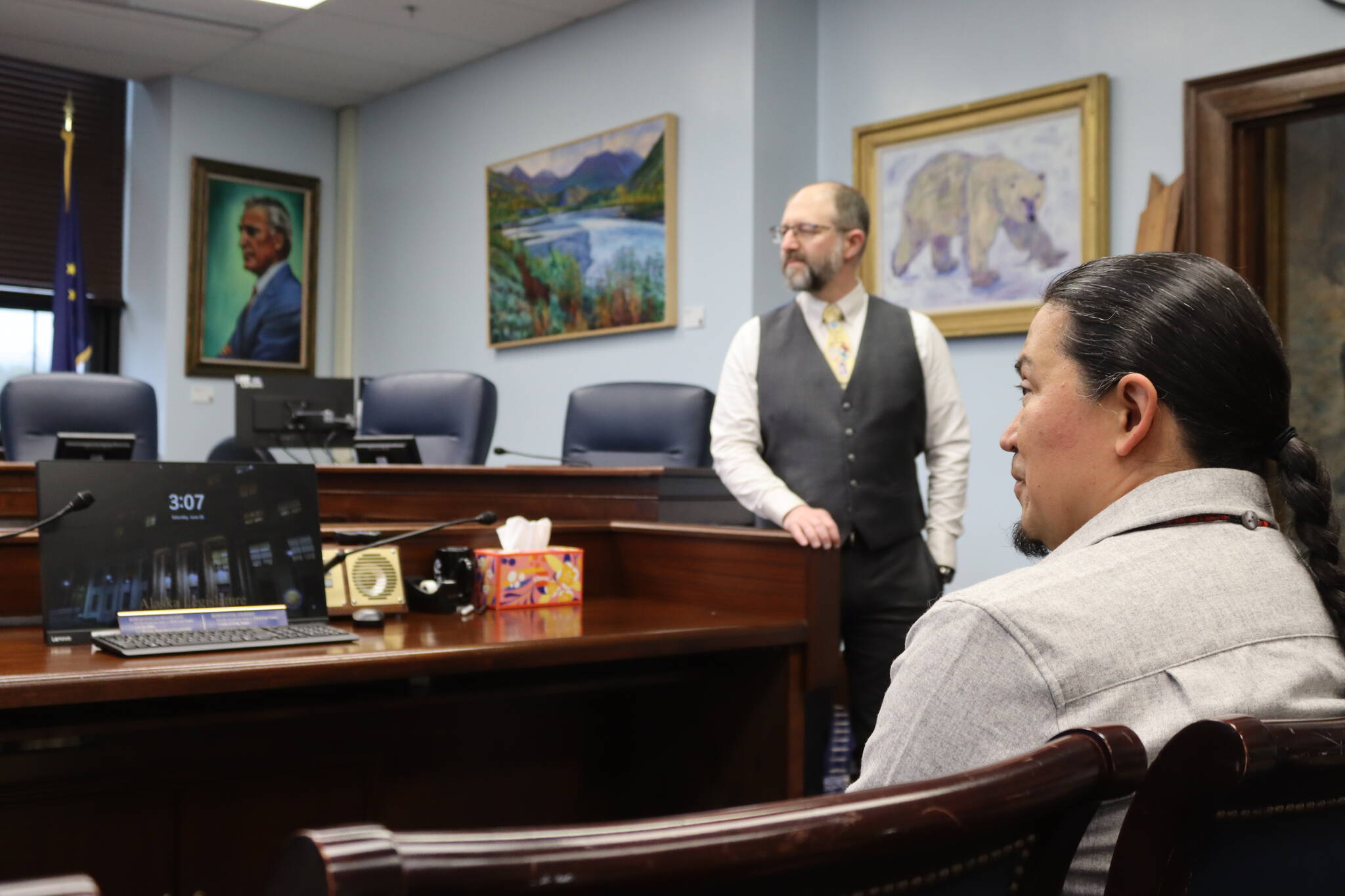Alaska Native language expert X̱’unei Lance Twitchell was honored with a legislative citation at the Alaska State Capitol on Saturday. The award recognizes his work on revitalizing Alaska Native languages and various creative endeavors.
A professor of Alaska Native Languages at the University of Southeast, Twitchell recently won an Emmy Award for his screenwriting of “Molly of Denali,” the first nationally distributed children’s program with an Alaska Native lead character. He is an active advocate for Alaska Native language education and was instrumental in the 2014 passage of House Bill 216, which recognizes 20 Alaska Native languages as official state languages on par with English. Twitchell has authored multiple Lingít textbooks and a book of poetry titled “Gagaan X’usyee/Below the Foot of the Sun.”
Rep. Andi Story (D-Juneau) sponsored the citation. She commended Twitchell’s resilience as he worked with legislators on the challenging task of language revitalization.
“You’ve been up here with presentations and questions, and this building does not always respond with the respect and work that is needed to have all of our people thrive,” Story said.
She also paid homage to Twitchell’s background, mentioning his parents, Timothy Twitchell and Debra Dennis Carltikoff, and grandparents Dorthy Dennis, Si Dennis, Anne Twitchell, and Timothy Twitchell. Originally from Skagway, X̱’unei Lance Twitchell has Lingít, Haida, Yup’ik, and Sámi heritage and belongs to the Lukaax̱.ádi clan.
“Our family, our ancestors, are so important,” she said. “I think it’s important to recognize your family, because, as I believe you would say, they are here with us in this room for this honor.”
Sen. Jesse Kiehl (D-Juneau) cosponsored the citation. He called Twitchell a “Ph.D.-holding, Emmy Award-winning international advocate,” and “kind of a rock star.”
“What a privilege it is for mere legislators to honor someone with your list of accomplishments and the work that you do every day,” Kiehl said.
Multiple friends and colleagues attended the presentation to honor Twitchell, including Rosita Kaaháni Worl, president of the Sealaska Heritage Institute. She said Twitchell’s teaching has helped reverse the decline of Alaska Native language speakers. Citing a production of Macbeth performed in the Inupiaq language, she said she has seen more engagement with Indigenous languages.
“You have brought the voices of our ancestors back to this earth, and you are ensuring that the voices of our ancestors will always be heard on this land,” Worl said. “If you could hear our young ones now in our ceremonies, the young ones are the ones who are getting up and speaking in our language and doing all the cultural protocols in the right way.”
UAS Chancellor Aparna Palmer described Twitchell’s language revitalization efforts as vital to the university. She said Indigenous cultural education enriches every student.
“You have been a champion for allowing these languages to prosper, and because of that, you bring something to everyone, not only the people that you are a part of, where you share their heritage, but everyone is enriched by having these languages spoken,” Palmer said.
As Twitchell accepted the legislative citation, he expressed gratitude to female Lingít speakers, calling them “the mothers of our language.” He recounted taking notes from female elders during language meetings on the correct pronunciation of certain words.
“I would sit in these language meetings, and some of the guys loved to talk, and they were very good at it, and some of them would just talk, talk, talk, talk, talk, and kind of dominate the whole conversation,” Twitchell said. “I would sit next to these two elders. One was Jigeitlaa ka Junaxtláa Irene Cadiente, and another was Yax_dulák Lillian Austin. They would say, ‘let me tell you how to say that thing right.’”
Austin and Cadiente were recognized in memoriam by the Alaska Legislature for their language work.
After the citation ceremony, Twitchell said he appreciated the recognition of his heritage.
“It was really emotional to hear the names of my parents and my grandparents, and my family,” he said.
As a professor, Twitchell considers Indigenous studies to be a collaborative field that’s heavily influenced by those who came before.
“To be in Indigenous studies means to follow in the footsteps of these pretty legendary people in terms of what they have been able to achieve,” he said.
He discussed a recent conversation he had with Dennis Demmert, who helped develop the Alaska Native Studies curriculum at UAF. Demmert recounted how recent revitalization efforts have reversed the decline of the Lingít language.
“He said he was remembering his time when he was in Fairbanks quite a while ago and working with some pretty famous linguists who were saying, ‘when a language gets down to 10 speakers, it’s dead,’” Twitchell said. “And then Lingít did get down to probably that few, perhaps. But look at us proving him wrong now.”
For Twitchell, the next steps are more accessible Lingít education materials. He’s currently helping UAS create a Master of Arts in Teaching Indigenous Languages, which is planned to launch in the fall 2026 semester. According to Twitchell, the program would help alleviate current pay and curricular inequities at the state level for Indigenous language teachers.
His long-term goals include standardizing scholastic knowledge of Alaska Native languages, with the possibility of an Alaska Native language course becoming a high school graduation requirement.
“We’re just trying to sort of push for more projects that will normalize languages, bring them more to the forefront of who we are as Alaskans,” Twitchell said.
• Ellie Ruel can be contacted via editor@juneauempire.com.

